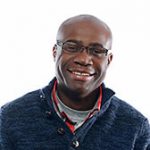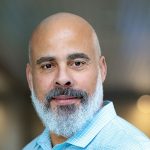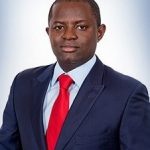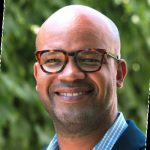On Juneteenth, Honoring 22 Black Biotech Leaders
A few Black people have risen to prominence in biopharma. Ken Frazier, Tony Coles, Rob Perez and Ted Love are among the most visible.
But there are many other Black leaders in the industry who are making important contributions to the science and business of human health.
Today, let’s recognize the Juneteenth holiday coming up June 19. It’s a celebration of emancipation. No one taught this in school when I was a kid, but on June 19, 1865 — long after the Emancipation Proclamation of Jan. 1, 1863 — the last remaining slaves in Texas were informed they were free.
This is a moment to celebrate freedom and progress and human potential.
For the biotech industry, I sought out some of the up-and-coming leaders who are Black. The focus here is on people who have made, and continue to make, an impact in science and entrepreneurship.
Karen Akinsanya, chief biomedical scientist, head of discovery R&D, Schrodinger
Akinsanya is the chief biomedical scientist at New York-based Schrodinger. She joined this fast-emerging $5.3 billion computational drug discovery company in 2018. She arrived with a wealth of experience in biology (PhD in endocrine biology from Imperial College London) and drug discovery (11 years in roles of increasing responsibility at Merck).

Karen Akinsanya
She was eager to learn and grow with the computational tools for drug discovery. Listen to her describe her journey on The Long Run podcast in January 2019 (before Schrodinger’s IPO).
Akinsanya, 53, recently joined the board of trustees at The Rockefeller University, and serves as a member of the scientific advisory board for Thermo Fisher Scientific and Seattle-based Variant Bio. She also volunteers in the New York area to inspire kids in grades K-12 to learn about science.
Andrew Farnum, CEO of Variant Bio, said Akinsanya went above and beyond in her role as an SAB member, recommending the person he ultimately hired as head of R&D. “She has experience on the genetics side, on the drug discovery side, her strategic thinking is incredible, and she’s a joy to work with,” Farnum says.
Terry-Ann Burrell, chief financial officer, Beam Therapeutics

Terry-Ann Burrell
Cambridge, Mass.-based Beam Therapeutics has captivated the imagination of investors with precise base editing technology. It’s another step in the CRISPR revolution, and showing promise through a partnership with Verve Therapeutics to edit PCSK9 as a one-shot treatment for cardiovascular disease.
Burrell, 44, is one of the leaders at Beam responsible for strategy, and telling the story of CRISPR base editing to investors.
She joined Beam after an 11-year run at JP Morgan. Her last job there was as managing director in the healthcare investment banking group. She worked on a lot of hot biotech IPOs of the past decade. “We were going to hire her to do our IPO at Beam but ended up hiring her as our CFO,” said Beam CEO John Evans.
Burrell joined the company in August 2019.
Evans added:
“She is a top executive at Beam driving our strategy and culture. She drove our IPO, a secondary financing, and a PIPE — three different financings in under a year, all successful, all in response to changing market dynamics. She’s incredibly well connected and respected in the field, recently joining the Board of Recursion where they also had a very successful IPO. And above all that, she’s an exceptional, warm human being with high integrity and a truly talented leader who inspires people.”
Abraham Ceesay, president, Cerevel Therapeutics
Ceesay didn’t go to medical school or get a PhD like many biotech executives. He didn’t know what he wanted to do after college. He was coaching football, while taking classes through an MBA program at Suffolk University. That’s where he discovered biotech, in the early 2000s.

Abe Ceesay
He set his sights on Genzyme, and worked his tail off to land an internship.
He loved it. Ceesay took on increasing roles of responsibility in more than 8 years at that pioneering biotech company. After that, he took on new commercial and operating challenges at smaller companies around Boston. From 2019 until earlier this year, he was CEO of Cambridge, Mass.-based Tiburio Therapeutics, a rare disease startup backed by NEA.
Last month, he took a new job as president of Cambridge, Mass.-based Cerevel Therapeutics, a developer of treatments for the brain founded through a partnership with Pfizer and Bain Capital. In this job, Ceesay is working closely with CEO Tony Coles on drug candidates for Parkinson’s, epilepsy, and schizophrenia.
“Abe brings exactly the broad leadership capabilities and operating experience that we need at Cerevel as we continue on our journey to become the premier neuroscience company,” Coles said in a statement. “I think the world of him,” he added.
Listen to Abe Ceesay describe his career path on The Long Run podcast from July 2020.
Kelly Chibale, professor, organic chemistry, University of Cape Town; founding director, H3D
Chibale is the founder and director of H3D, at the University of Cape Town in South Africa. It was started in 2010 as the first integrated drug discovery center in Africa.

Kelly Chibale
In 2018, H3D formed a five-year partnership with Germany-based Merck KGaA and Medicines for Malaria Venture to work on malaria drug discovery.
Colin Wilson, also a South African and medicinal chemist by training who worked for Chibale for almost six years, raves about how his former boss grew the organization from a handful of people to about 80 over a six-year period.
The team delivered results with the first two clinical candidates discovered and developed on the African continent for the treatment of malaria.
Wilson wrote:
“One of his main goals is to create long term opportunities for scientists on the African continent. His aspiration is to catalyze a bioscience industry in South Africa with his research to help fight Africa’s “brain drain”. He is also an advocate for more equitable and representative clinical trials and speaks out against what he calls “afro-pessimism”, the pessimistic view that the western world has over Africa and its scientists.”
Chibale was featured in Fortune in 2018 as one of the World’s 50 Greatest Leaders.
Kizzmekia Corbett, assistant professor, department of immunology and infectious diseases, Harvard T.H. Chan School of Public Health
Corbett is one of the scientific heroes of the pandemic.

Kizzmekia Corbett
After getting her PhD in microbiology and immunology from the University of North Carolina-Chapel Hill, she went to the Vaccine Research Center at the National Institute for Allergy and Infectious Disease (NIAID) in Bethesda, Maryland.
There, working in collaboration with Moderna, she was involved in developing the mRNA-1273 vaccine directed at the spike protein. That vaccine is one of the two mRNA vaccines that delivered 95 percent vaccine efficacy against the novel coronavirus in randomized Phase III clinical trials conducted in less than 12 months.
Not only was Corbett one of the key contributors to this extraordinary accomplishment, she spent much of the past year dedicated to fact-based, contextual science communication on social media. She took on extra work to do targeted community outreach to build vaccine confidence.
She will now get to write the next chapters of her career as an assistant professor in the department of immunology and infectious diseases at the Harvard T.H. Chan School of Public Health.
Howard E. Davis, COO at stealth startup
Davis is working on a stealth startup, which I’m hearing is backed by Atlas Venture.

Howard E. Davis
Davis comes to this challenge with a mix of science and business experience. He got his bachelor’s in chemical engineering at Yale University, and a PhD in biomedical engineering at MIT in 2002.
His first large pharma job was at Novartis, where he worked on commercial efforts on therapies for multiple sclerosis and age-related macular degeneration. He then took on increasing roles of responsibility, including a couple of vice president roles at Biogen. He made the leap into the startup world in 2018, initially at Flagship Pioneering.
Peter Emtage, venture partner, Versant Ventures
Emtage’s career has taken off the past few years.
Emtage got his PhD in molecular virology, immunology and inflammation at McMaster University in Ontario, Canada. He did a couple stops in academia at the National Cancer Institute and Harvard Medical School.

Peter Emtage
The big leap in industry came about five years ago. In 2016, he joined Cell Design Labs as chief scientific officer. It was a startup focused on T-cell engineering from Wendell Lim’s lab at UCSF (see my Forbes coverage at the time). This was before the first couple of CAR-T therapies for cancer were approved by the FDA – a watershed moment for cell therapy.
A few months after Gilead acquired Kite Pharma in 2017, it followed up by also acquiring Kite’s little partner, Cell Design Labs, for $567 million. Emtage stuck around at the big merged company for a couple more years as global head of cell therapy research for Gilead / Kite.
In October 2020, he left to join Versant Ventures as an entrepreneur-in-residence. Six months later, he was promoted to venture partner.
Jackie Grant, principal, Abingworth
Grant was moved last July in the wake of America’s racial reckoning over the killing of George Floyd, and the inequities exposed by pandemic.
She looked into the numbers of fellow partners and investment decision-makers at top-tier biotech venture firms to see how many were Black women, like her.

Jackie Grant
She found none.
That finding may not have been a surprise, but it does matter. As Grant wrote in Nature Biotechnology:
“Although venture capitalists comprise a small segment of the life science industry by numbers, they hold outsized influence and power over the sector: the power to invest millions of dollars into innovation and to incubate new companies; the power to offer senior positions in startups and to shape companies through board positions; the power to create wealth.
Today, that power sits outside of the hands of under-represented racial minorities.”
Grant is building her career, seeking to become one of the people who changes things.
She joined Abingworth in 2018. Before that, she worked in business development at Genentech. She got her PhD in neuroscience at Stanford School of Medicine, and an MBA from the Stanford School of Business.
She’s interested in gene therapy, and oversaw Abingworth’s Series A investment in Durham, NC-based Atsena Therapeutics. It’s doing AAV-based gene therapy with novel capsids to enable intravitreal delivery to the eye for ocular diseases. The hope is this will provide a better safety profile, and higher rate of gene transduction into key cell types, Grant said last December.
“Jackie is a super savvy investor and really an emerging leader in the venture community. I have a ton of respect for her passion and expertise in neuroscience,” Abe Ceesay wrote.
Yvonne Greenstreet, president and COO, Alnylam Pharmaceuticals
Greenstreet came to Alnylam with a long track record in management at Pfizer and GlaxoSmithKline. In her last job at Pfizer, she was the senior vice president and head of medicines development, a member of the executive team for the specialty business.

Yvonne Greenstreet
She joined Alnylam as chief operating officer in 2016 and was promoted to president and COO in October 2020.
During her time at the company, Alnylam has grown. The company has become more commercial, more international, bigger and more complex. It introduced its first marketed RNA-interference medicine in 2018, and now has three products on the market – Onpattro, Givlaari and Oxlumo. Net product revenues almost doubled in the first quarter of 2021.
“Yvonne is a remarkable leader — in my view one of the strongest in biopharma today — who understands the intersection of science, medicine, and business and how these combine to maximize impact for patients and value creation for shareholders,” said Alnylam CEO John Maraganore. “As our president, she makes bold decisions, provides exceptional leadership, and exemplifies our core values.”
Colin Hill, co-founder and CEO, GNS Healthcare
Hill co-founded Somerville, Mass.-based GNS Healthcare in 2000, and has served as chairman and CEO from the start.

Colin Hill
Obviously, he’s seen a lot of change in healthcare and information technology. Surely, it has taken some grit to endure cycles of hype and the thicket of organizational atherosclerosis, perverse incentives, and confusing policies that have made healthcare and biopharma such challenging domains for healthtech entrepreneurs.
GNS has adapted at many junctures. The latest thing at GNS is what it calls an “in silico patient” that uses AI to simulate drug treatment in an individual before that individual gets the drug. The company has developed tools for various cancers, including prostate cancer and multiple myeloma. It’s also attempting to predict which patients will respond to checkpoint inhibitor therapy for cancer.
GNS said in January 2020 that it raised $66 million in a Series D financing that included Merck Global Health Innovation fund, Amgen, BMS, Cigna, and Horizon Blue Cross of NJ among others.
William Hobbs, VP of hematology, Vertex Pharmaceuticals
Hobbs, a physician who got his MD at the University of Pittsburgh School of Medicine, is now the VP of clinical development for hematology for Vertex Pharmaceuticals.

William Hobbs
That means he’s in a key leadership position for the CTX-001 program in partnership with CRISPR Therapeutics – the gene editing program that is showing remarkable results – potentially curative data – for the treatment of sickle cell disease.
If these data hold up, it will be one of the biotech great achievements. It would also mean a lot for people with a terrible disease that has been neglected too long.
Enoch Kariuki, former CFO, VelosBio and SVP of corporate development, Synthorx
Kariuki was the chief financial officer of San Diego-based VelosBio when it was acquired by Merck for $2.75 billion in cash in November 2020. Merck is now developing its antibody-drug conjugate aimed at ROR1 for hematologic malignancies and solid tumors.

Enoch Kariuki
Before VelosBio, Kariuki worked as senior vice president of corporate development with San Diego-based Synthorx. That protein engineering company, starting with its engineered version of IL-2 for cancer, was acquired by Sanofi for $2.5 billion in December 2019.
“Enoch is a wonderful person. He is about to have his first CEO role. I’m sure the first of many,” said Laura Shawver, who worked with him when she was CEO of Synthorx.
Darrin Miles, chief commercial officer, Agios Pharmaceuticals
Miles has been with Agios for about six years, advancing in management as the Cambridge, Mass.-based company developed its first FDA approved treatments. The company sold its cancer business to Servier in December for up to $2 billion.

Darrin Miles
That means Agios is now focused on treatments for genetically defined rare diseases that include pyruvate kinase, or PK, deficiency, thalassemia and sickle cell disease.
Prior to joining Agios, Miles had a long run on the commercial side at Genentech.
Paul Mola, founder, president and CEO, Roswell Biotechnologies
San Diego-based Roswell Biotechnologies has a big ambition for DNA sequencing — to sequence whole genomes for $100 in about one hour. Its vision to get there is through molecular electronics.

Paul Mola
Mola and Roswell chief scientific officer Barry Merriman have a long history of working together on sequencing technologies. They were at Life Technologies when that company acquired Ion Torrent Systems, an early mover in semiconductor-based sequencing, for $725 million.
Roswell raised $32 million in a Series A financing in early 2019. Read more about its concept in this TR piece on novel sequencing technologies from June 2020.
Mola recently joined the board of Biocom California, an industry trade association.
James Mutamba, VP, business and corporate development, Pyxis Oncology
Mutamba got his PhD in biological engineering from MIT. He went to work in 2012 at Boston-based Puretech Health, getting exposed to a lot of entrepreneurial ideas and teams.

James Mutamba
From there, he went to Longwood Fund, where he became an investment principal and served on a few boards. Longwood founded Pyxis Oncology, and in early 2020, Mutamba went to work there as VP of business and corporate development.
In March, Pyxis said it in-licensed a pair of antibody-drug conjugates from Pfizer, along with a license to Pfizer’s ADC technology. One of the new Pyxis candidates aims to be a first-in-class non-internalizing ADC that targets a tumor-restricted antigen that is overexpressed in several solid tumor types to selectively kill tumor cells while also enhancing an anti-cancer immune response.
A couple weeks after the Pfizer transaction, Pyxis announced it raised a $152 million Series B financing.
Daphne Zohar, founder and CEO of Puretech, said, “James is determined and charismatic. One of the qualities I admire about him is his open mind when it comes to ideas that are off the beaten path and the related creativity that leads to.”
David Steinberg, general partner at Longwood Fund and the former CEO of Pyxis, added: “James is a skilled and creative leader, innovator and business development professional with a keen eye for translating technologies into medicines. He has founded or co-founded multiple important companies and led major transactions underpinning critical products and development programs. I look forward to collaborating with James for years to come.”
Jen Nwankwo, founder and CEO, 1910 Genetics
Nwankwo got her PhD in pharmacology at Tufts University School of Medicine in 2016, where she did her dissertation on sickle cell disease – a traditionally understudied area of biology that disproportionately affects Black people. After some time as a consultant, she got to work on Cambridge, Mass.-based 1910 Genetics.

Jen Nwankwo
In March, the company came out of stealth mode, announcing $26 million in seed and Series A capital. The plan is to bring together the tools of biological automation, computation, and AI for platforms to advance small and large molecule drug discovery. Her syndicate of backers include M12 – Microsoft’s Venture Fund, Playground Global, Sam Altman’s Apollo Projects, Y Combinator, FoundersX Ventures, and Scientia Ventures.
“Jen Nwankwo is future superstar in our industry,” said Rob Perez, operating partner at General Atlantic. Abe Ceesay concurs. “A phenomenal talent,” he said.
Peter Olagunju, SVP of technical operations, FerGene
Olagunju has gained valuable experience over the past two decades of growth in gene and cell therapy.

Peter Olagunju
He started out in quality assurance roles, and worked his way up at three important Seattle biotech companies – Targeted Genetics (gene therapy), ZymoGenetics (protein drug developer acquired by BMS), and Dendreon (developer of Provenge cell therapy for prostate cancer).
Besides those valuable experiences in different aspects of science, Olagunju gained management experience, and got an MBA at the University of Washington.
Olagunju moved to Boston and went to work at Bluebird Bio in a variety of technical operations roles during the company’s growth phase from 2015 to 2020. He left there a little over a year ago as VP of technical operations to become senior vice president of technical operations for FerGene.
The Cambridge, Mass.-based company raised $570 million in November 2019 from Blackstone Life Sciences and Ferring Pharmaceuticals to develop a gene therapy for bladder cancer that isn’t responsive to BCG treatment.
Cameron Pitt, chief business officer, Quanta Therapeutics
Pitt got his PhD in biomedical sciences from UCSF, focusing on cancer, particularly the RAS pathway and how its various mutations drive malignancy.

Cameron Pitt
After graduate school, he went to work in venture capital, first at Versant Ventures and then at Sofinnova Investments.
Quanta, founded in 2018, is a Sofinnova Investments portfolio company working on allosteric modulators to target driver oncogenes – something relevant to Pitt’s earlier experience in the lab.
Derrell Porter, founder and CEO, Cellevolve Bio
Porter got his MD and MBA from the University of Pennsylvania before entering industry. He did a stint as a consultant at McKinsey, and later gained a wide range of US and international experiences in strategy and business development at AbbVie and Amgen. He was a vice president at Gilead Sciences from 2013 to 2017 before joining Atara Biotherapeutics as global head of commercial.

Derrell Porter
A couple years ago, he saw a market opportunity to help many cell therapy startup companies.
While staying focused on the science and early development, they also need to lay the groundwork for commercialization while relatively early in development. Porter set out to start a new company, Cellevolve Bio, in 2020, to help companies do this. Porter tells me he’s secured the first license for Cellevolve, and expects to close a seed financing this month.
Last month, Porter joined the board of Philadelphia-based Passage Bio, a publicly traded company working on rare CNS diseases.
Uciane Scarlett, principal, Oxford Sciences Innovation
First, her name is pronounced “YOU-shuh-knee” Scarlett.

Uciane Scarlett
Uciane is originally from Jamaica. She came to the US to get her PhD in cancer immunology at Dartmouth Medical School.
She went to work as a consultant (Clarion), at a startup company (Compass Therapeutics), and in venture capital (Atlas Venture). She moved to the UK in 2019 to join Oxford Sciences Innovation, to build on her knowledge of cancer biology, startups, and her network in the Boston biotech community.
Uciane was a member of my Kilimanjaro Climb to Fight Cancer team that raised $1.6 million for the Fred Hutchinson Cancer Research Center and summited the highest mountain in Africa in 2019. I know how hard she worked. She has also written a few excellent guest articles for TR about adaptive trials, SPACs, and on “turning the black nod into a collective nod.”
It was about a brief, but meaningful moment at the JP Morgan Healthcare conference one year when Ken Frazier showed her a little support.
Uciane’s portfolio at Oxford is still in the early days, but reflects her interests in a number of hot scientific areas — T-cell therapies for cancer, autoimmunity and infectious disease, neuromuscular diseases, antibody therapies for autoimmunity, and gene modifiers for cancer and rare disease.
RA Session II, founder, president and CEO, Taysha Gene Therapies
Session, 42, has worked his way up the business side, gaining experience in business development, finance, and corporate strategy prior to becoming CEO of Dallas, Tex.-based Taysha Gene Therapies. He focused on rare diseases at BridgeBio, AveXis (the developer of Zolgensma, the AAV9-vector based gene therapy for spinal muscular atrophy type 1, acquired by Novartis), and PTC Therapeutics.

R.A. Session II
Before starting Taysha, Session was an entrepreneur-in-residence at UT Southwestern Medical Center. Relationships there proved important.
Session structured a broad collaboration in which UT Southwestern leverages its expertise in AAV9 vectors for gene therapy. The academic side does discovery and preclinical work, leaving Taysha responsible for clinical development, strategy, regulatory filings, and commercial manufacturing.
While getting that deal in place as the foundation for the company, Session recruited the executive team, built a 120-person company, and led a successful IPO in September 2020 that raised $157 million at $20 a share.
That’s a whirlwind for a company that’s less than two years old. The pace appears to be continuing. Taysha has said it plans to have four gene therapies in the clinic by the end of 2021.
R. Nolan Townsend, CEO, Lexeo Therapeutics
Townsend, a former president of Pfizer’s rare disease division in North America, took the entrepreneurial plunge earlier this year.

R. Nolan Townsend
He’s now the CEO of New York-based Lexeo Therapeutics, a clinical-stage gene therapy company that raised an $85 million Series A financing in January, co-led by Longitude Capital and Omega Funds.
The company has programs in the works on an IV-administered therapy for cardiomyopathy associated with Friedreich’s ataxia, a CNS-administered therapy for CLN2 Batten disease and a CNS-administered therapy for APOE4-associated Alzheimer’s disease.

